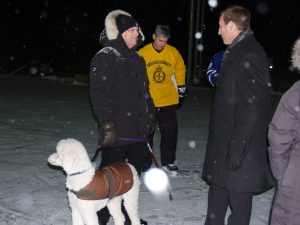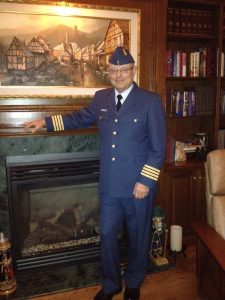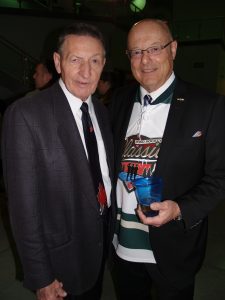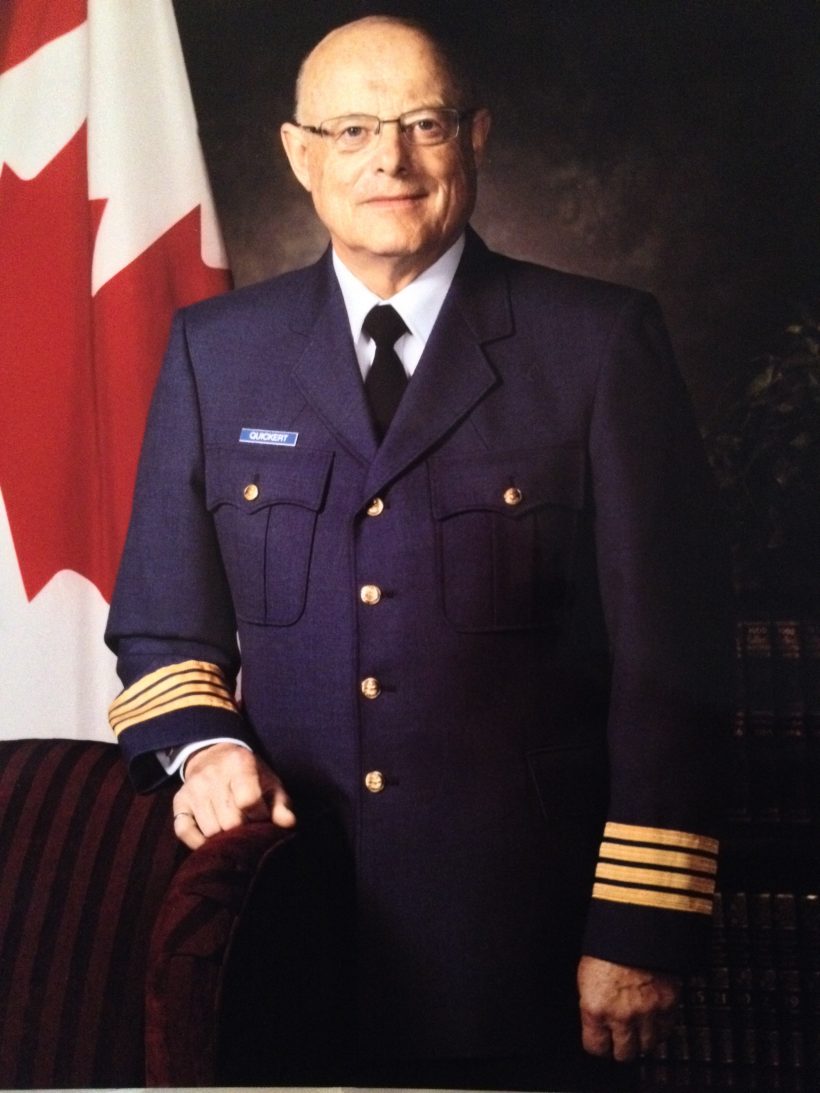THE LIFE OF ARMIN QUICKERT by BARNEY MOORHOUSE
I first met Armin Quickert at the CFB Trenton Pond Hockey Classic in 2013. He was observing the official “puck drop” by then Minister of National Defense Peter MacKay. The tournament is a fund raiser for The Military Families Fund which helps support military members and their families deeply affected by loss of life and other unforeseen circumstances resulting from service. In 2014, it reached out to include the Trenton Memorial Hospital Foundation.

Born in Germany in 1940, Armin Quickert was the middle of three sons for Elizabeth and Arthur. Arthur Quickert graduated from the Dairy Masterschool at the head of his class and went to work as a dairy plant manager. With the Russian armies advancing during WW 2 the Quickerts were forced to flee, not easy to imagine with an infant and two older boys, often separated from their father. In her book, the Quickert Family, Elizabeth described the trials and tribulations faced by her family. At one time they stayed with “a poor little farmer. The cows, hens, some pigs all lived in the same house where the farmer lived.” On another occasion, mother and her 3 sons lived near Neuhaus village where coincidentally Herman Goering, Field Marshal and Commander of the German Air Force, had a castle overlooking the village. Apparently Goering was a big fan of Canadian hockey.
While living near Neuhaus food was in short supply and Armin’s mother had to travel afar for supplies. She wrote that only the rich could afford to hunt. “The Americans used to drive through the woods in their jeeps at night with high beams and shoot every deer they could see.” In order to feed her family, Elizabeth had to navigate the woods at night and fearing the American hunters would often hide behind trees, afraid of being shot.
Reuniting as a family, after the war, in Konigstein, even though they did not have permission from the authorities, the Quickerts moved into two rooms above a dairy. With no plumbing the water had to be carried up and down. “The toilet was half way down the stairs and used by three families…There was no flush toilet, just an ordinary seat with a big pipe which ended in a septic tank. Farmers came, scooped it out and used it on their fields and gardens. They were glad to get it for nothing. “We were privileged to use the warm boiler room for our weekly bath in a wooden tub.”
EDUCATION
In Germany children started high school after four years of public school if they wanted to attend university which followed 9 years of high school. Otherwise they stayed in public school to grade 8 and then learned a trade or entered the work force. Parents paid a monthly tuition fee for high school as well as purchasing all the books and paying for bus service. (In Ontario, during the 60s, we had to purchase our own high school texts and arrange for transportation to school. In addition, students had to choose which educational path to follow – business, trades or university. The only community college was Ryerson.) One of Armin’s class photos shows 56 pupils.
Armin “loved to make money,” his mother wrote. Before emigrating to Canada, he loaded up many books, took them to market and sold all. Including the wagon he had built. The Quickerts wanted to move to New York State where they had relatives but that would have required a sponsor to guarantee $5000 per person. “That was impossible as it would have cost $25,000,” wrote Elizabeth.
In 1951, they read an ad in a little paper stating that Canada had opened her doors for “healthy Germans who were skilled and willing to work.” Seeking dairy related employment the Quickerts settled on Belleville (pop. 14,000) described as “dairy and fruit farming country.”
In October 1951 they set sail for a 10 day trip to Quebec City on the Castle Bianca, an Italian ship, for a rough seasick passage fearing, at one point that the ship would sink. From Quebec they travelled to Oshawa by train then by bus to an immigration camp in Ajax where they were told there were no jobs in Belleville. They were sent on by train to Kingston where they were told that they were expected in Belleville where they finally arrived on October 28.
Arthur Quickert began work on November 1, 1951, for the Black Diamond Cheese Company at 75 cents an hour. Working 7 days a week with overtime due to Christmas sales he earned $76.00 for over 80 hours in just one week. Elizabeth found employment as a sewing machine operator for Deacon Bros. at $20.00 a week. And, they rented an apartment for $50.00 a month – including heat, an electric stove, refrigerator and bathroom. Armin and his brothers became Toronto Star carriers. Then Armin and younger brother Nick left the paper to work as pin boys at Bill Bateman’s bowling alley on Front Street. Proving themselves to be reliable, hard working and smart the boys often ran the Saturday business working from 10 a.m. to closing up at midnight.
In 1954, Armin became a Canadian citizen.
In 1959 Armin enrolled at the University of Toronto where he graduated as an Industrial engineer.
At age 56, Arthur Quickert purchased Riverside Dairy in Trenton, which also produced butter and cheese, taking over auspiciously on April 1, 1964. Armin left Dupont in Kingston and joined his father in 1965. In 1966 they bought a second dairy in Trenton. During Confederation celebrations Quickerts purchased Reid’s Dairy in Belleville. Armin managed Reid’s which, in addition to having a fleet of delivery trucks had a milk wagon pulled by the ever popular horse, “Joe”, for household deliveries on Belleville’s west side.
To accommodate the ever expanding business Armin purchased a 3.5 acre lot on Bell Boulevard at the corner of Sidney Street in 1984 for a new dairy. He designed and supervised construction of the new facility in addition to overseeing the installation of new equipment. The first milk was processed in the new plant in April 1985. The Daisy, the company logo, adorns the front of the building as well as the last horse drawn milk wagon which is on display.

HONORARY COLONEL
In a process that takes 8 or 9 months at the Ministerial Level in Ottawa, beginning with a nomination, Armin Quickert, P.Eng, became Honorary Colonel of 8 Wing/CFB Trenton, Canada’s largest airbase, in December 2011. The term of office is 3 years subject to 6 month extensions. The title, Honorary Colonel, is for life. The appointment is a Commission by Queen Elizabeth.
Some of Quickert’s most memorable experiences as Hon. Col. involved his trips to CFB Alert, the most northerly settlement in the world, missions which involved a change of command and supplying a large fire truck and a tracked ambulance with trailer. He recounted how both he and his wife have travelled the world to many adventuresome places, “however Alert tops them all… one experiences the enormity of Canada.” Flying north for 5 hours at 500 mph to reach Alert, not having ever left Canada, made a lasting impression as did landing at noon, in total darkness, on a one mile frozen gravel airstrip. Quickert saw Alert’s similarities with the International Space Station. “The only method of transportation is by means of a flying vehicle supplying the materials to sustain life in such a harsh environment.” Visiting many local monument sites hit home with the realization that many had perished there over the years. “I felt these individuals are the Heroes of the Canadian Arctic, much like the early explorers who planted our flag.” He added, “Flying in the far and remote Arctic is at best challenging.” The special outdoor Arctic clothing strongly resembled that of an astronaut. Having inspected the Scientific Weather Station, it became apparent that the purpose of Alert is not only Military but also research.

For Armin Quickert “Life is a Highway” (to quote Tom Cochrane’s international hit) both literally and figuratively. As a young lad fleeing the Russian invaders he would have had absolutely no idea what adventures and opportunities lay ahead. 2014
